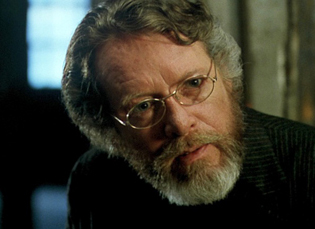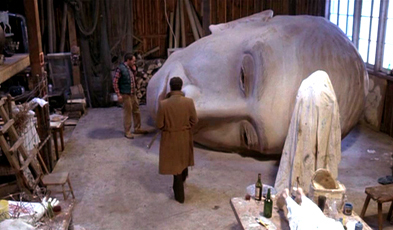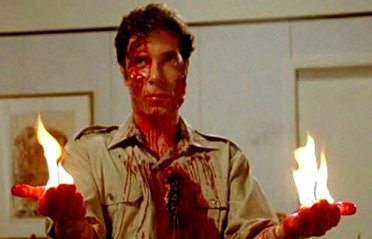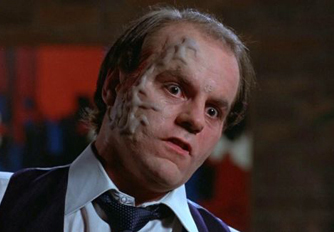
 |
|
|
|
Criterion's impressive Videodrome disc includes a clip from a 1982 TV talk show featuring a gathering of four then-hot young horror film directors: John Carpenter, John Landis, Mick Garris and David Cronenberg. Of the four only Cronenberg appears eager to discuss and analyze screen horror; he alone seems fascinated by the genre. Of course, we realized long before that the Canadian director was a wild card maverick. From Shivers (They Came from Within) forward, each won wide distribution, probably due to a highly commercial "ick" factor. Cronenberg attracted quality collaborators despite being tagged as a maker of 'gynecological horror'. Shivers brought Barbara Steele back to the screen at a time when many fans thought she had retired. The Brood had Oliver Reed and Samantha Eggar. Even the relatively primitive Shivers has a meaningful premise, intelligently worked out; Cronenberg's pictures are disturbing because of their unblinking attitude to the fact of our alienation from our own physical bodies. Most of us are repelled by our bodily functions, as we're culturally trained to think of ourselves as spiritual beings made in God's image. Gothic horror often touched upon the idea that we have a bestial quality that needs to be repressed. Cronenberg motivates his horrors with out-of-control (or purposely perverse) science. In one show, an artificially created organ behaves like a venereal disease. Another 'custom appendage' turns its owner into a sexual vampire. An experiment that externalizes psychological traumas causes a woman to give birth to monstrous creatures that carry out her subconscious desires. None of these ideas fall within the boundaries of common Good Taste. 1981's Scanners became Cronenberg's breakout hit. He successfully translates science fiction ideas about mental telepathy to the screen and does a fairly good job integrating them into a thriller about competing psychic supermen. Brian De Palma had scored a massive commercial hit with Carrie, a movie about a telepathic teen defending herself against bullies. His flashy but disorganized follow-up The Fury added little to the concept. Scanners starts from the basics and adheres closely to its own interior logic. It's genuinely scary, and not just an exercise for ostentatious gore. Initial viewers of Scanners often got no farther than its biggest, genuinely shocking scene, a masterful bit of Guignol beautifully teased in trailers and TV spots: this is the movie where a guy's head explodes. 
The story concerns shady experiments conducted in modern research companies. The ConSec Corporation has for years been nurturing a new breed of telepaths. Called 'scanners', they were originally created by Ephemerol, a drug given to pregnant women. Having lost contact with most of the scanners it has identified, ConSec has reason to believe that a competing entity is rounding them up for unknown, nefarious purposes. Dr. Paul Ruth (Patrick McGoohan) has a big problem with Darryl Revok (Michael Ironside) a crazed scanner who has gone renegade, and is assassinating all the scanners he can find. With his psychic skills Revok easily penetrates ConSec security and kills the company's staff scanner researcher (Louis Del Grande). Dr. Ruth has the derelict scanner Cameron Vale (Stephen Lack) kidnapped and brought to ConSec for his own safety. The homeless Vale is helped to control his 'talent' and clear his mind of unwanted telepathic chaos from normal people. Ruth then sends his disciple out to seek out Darryl Revok and put an end to his murderous interference. Dodging Revok's killer squads, Vale joins up with fellow threatened scanner Kim Obrist (Jennifer O'Neill). But the opposition always seems to be waiting in ambush. Could there be some kind of double agent back at ConSec, acting on Revok's behalf? The time-tested paranoid conspiracy thriller format provides Scanners with action and mayhem, enough to satisfy fans and fill out an exploitative trailer. What's amazing is that writer-director Cronenberg doesn't compromise his fairly cerebral story concept. The Fury disintegrated into a series of ever-sillier telepathic attacks and stylish set-pieces. A decade before that, George Pal's awkward The Power was a premature attempt at a similar story that lost itself in plot detours and confusing 'surreal' imagery. Cronenberg's flow of exciting ideas is never interrupted, and his nods to surrealism are more direct. In one scene, a critical discussion takes place inside a giant artwork of a human head. 
The movie features a truly disturbing characterization in Darryl Revok, an incredibly dangerous guy capable of 'fogging men's minds' and imposing his will on their actions. As played by the arresting actor Michael Ironside (Starship Troopers), Revok is scary, plain and simple. He responded to ConSec's early scanner training by attempting to bore a hole through his skull with an electric drill. Revok effortlessly hijacks ConSec's demo presentation by mentally hiding his scanning talent. He seizes mental control of his host, and so strongly bombards the man's nervous system that his brain explodes. Cronenberg then runs wild with his central idea, brilliantly incorporating ideas from classic science fiction. When we learn that Revok's conspiracy seeks to breed a new race of scanners, we may well imagine a plague of telepathic children similar to those of Village of the Damned. The world could be conquered overnight by a drug-altered new race of men, a thought that echoes back to H.G. Wells' original novel Food of the Gods. "Better Living Through Drugs" was an optimistic slogan that too often turned the general population into a testing ground for modern day mad scientists. The parallel of Cronenberg's fictitious "Ephemerol" to the tragic real-life drug Thalidomide is just the kind of taste-challenged content that leads Scanners into Dangerous Idea territory. Most sci-fi / action thrillers soon abandon whatever ideas they might have in favor of chase scenes and random gunfire. Scanners instead leaps onto a new level of conceptual menace. Waiting in a doctor's office, Kim Obrist suddenly realizes that she's being scanned by an expectant mother's unborn fetus. The fear of the future is the fear of change, of progress, the fear that technology will make us obsolete. Marvelously rich in ideas, Cronenberg's fairly modest production is a core title in filmed science fiction. 
The young director makes sure to give his already devoted horror fans what they've come for. Dick Smith's special makeup work delivers jarring, grotesque images that really grab one by the stomach. The detonation of Louis Del Grande's head breaks all the rules by going 'full visceral' -- no smoke or cutaways intrude to 'tastefully' hide anything. Michael Ironside's powerhouse acting adds immensely to the final showdown, as Revok practically turns his flesh inside out to concentrate on obliterating Cameron Vale, mind and body. Retreating into a Buddha-like trance, Vale's strategy appears to be a passive-aggressive surrender followed by a telepathic sneak attack. Cronenberg has shrewdly front-loaded his film with its strongest shock scene, which keeps his audience hanging in nervous suspense for the rest of the picture. Scanners shows the director relying on good casting. Fan favorite Patrick McGoohan lends his heavyweight presence to the script's complex exposition about telepathy and ConSec. Michael Ironside is a disturbing new star as the genuinely frightening Revok. Pretty Jennifer O'Neill has an unexpectedly small role but carries her end well, especially in that scene in doctor's office. New York artist Stephen Lack fronts a good look as the lost soul learning about his own powers while playing the role of psychic detective. Unfortunately, too many of Lack's most important line deliveries are just not good. A genre effort like Scanners can skate over many flaws, but Lack's performance always stands out. Criterion's Blu-ray + DVD of Scanners gives this sci-fi shocker a new lease on life. It and The Brood were previously released on mediocre DVDs by MGM. This new HD transfer works wonders with cinematographer Mark Irwin's slick cinematography, and flatters the expressive designs of art director Carol Spier. Howard Shore's menacing music track gets a boost as well. The new disc has a wealth of desirable, illuminating extras. The substantial featurette The Scanners Way is a making-of piece with plenty of input from the actors and extra attention given to the film's special effects. Mental Saboteur is an interview with the riveting Michael Ironside, who is just as forceful when speaking to a docu camera. Ironside's comments and anecdotes pull us into his spell, which is only broken when he implies that his character was based on watching a real telekinetic person in action. The interview piece The Ephemerol Diaries presents Stephen Lack as an intelligent, engaged artist who met director Cronenberg in the New York art scene. Lack remembers the film with great affection. 
Beyond approving the dark and rich film transfer, Cronenberg's input is limited to an extended interview on Canadian TV's The Bob MacLean Show. After only a few seconds listening to the director, one realizes that he's the real deal, a well-adjusted serious artist with the smarts to express himself and survive in the commercial film market. Another disc highlight is the inclusion of David Cronenberg's first feature, Stereo. Structured like a research report, the 1969 film is the work of an art student making the most of limited resources. Freaky things are happening at a place called The Canadian Academy for Erotic Inquiry. The jargon-laden tech talk in the voiceover (the film's only audio) lets us know that eight volunteer subjects have undergone 'pattern brain surgery' to turn them into functioning telepaths. The film is an hour of thick pseudo-scientific ramblings, but writer Cronenberg's ideas are way, way ahead of the curve. We learn that a telepathic bond must have an emotional component, which is where the sexual element enters. The investigators choose one test subject to mentally dominate the others, in the hopes of establishing a functioning telepathic commune. Some of the 'submissive' telepaths erect fake "schizo-phonetic partitions" to prevent a takeover of their personal identities. Others agree to have their speech centers in their brains removed to make telepathy their only outlet for communication. Cronenberg's visuals are vague representations of test subjects interacting. They're often little more than a background for the intense narration, a strategy that reminds us of the experimental German sci-fi 'anti-movie' Der große verhau. Yet Cronenberg manages some arresting images. A boy caresses a biology mannequin while a few feet away his topless and blindfolded girlfriend 'experiences' his pleasure by brainwaves alone. Test subjects carry ordinary baby pacifiers� to perhaps focus their erotic thoughts? The pacifier is visually compared to the "Ankh" symbol, and at one point we see a rebellious subject cutting a pacifier into pieces. When finally covered by Variety in 1984, the reviewer "Cart." acknowledged that Stereo was virtually unwatchable, yet instantly recognizable as the work of a talent with great promise. Seeing Stereo gives us more reasons why David Cronenberg had so little in common with his horror-director contemporaries. Lost in his grisly domain of 'body politics', Cronenberg was definitely operating on his own plane of awareness, somewhere over the conceptual horizon. A trailer and some radio spots are included. Criterion's insert booklet contains an essay by noted commentator and author Kim Newman. The disc's arresting cover art is by Connor Willumsen.
On a scale of Excellent, Good, Fair, and Poor,
Scanners Blu-ray + DVD

The version of this review on the Savant main site has additional images, footnotes and credits information, and may be updated and annotated with reader input and graphics.
Review Staff | About DVD Talk | Newsletter Subscribe | Join DVD Talk Forum |
| ||||||||||||||||||